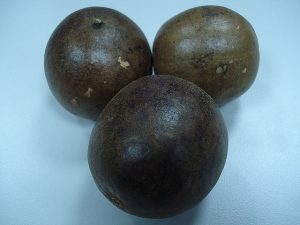The Natural Non-Caloric Sweetener Luo Han Guo
 In the 13th century, a fruit belonging to the gourd family called Luo Han Guo was said to be grown and eaten by monks in a mountainous area of Southern China.
In the 13th century, a fruit belonging to the gourd family called Luo Han Guo was said to be grown and eaten by monks in a mountainous area of Southern China.
Now, eight hundred years later, Luo Han Guo, commonly called monk fruit, has been developed into a natural sweetener that might be of interest to those wanting to reduce their sugar consumption.
A monk fruit, or Luo Han Guo sweetener is completely or almost calorie free – some sources say there are 2 calories per serving – and has no artificial or chemical aftertaste. It’s stable at high temperatures, so makes a good cooking and baking sugar substitute, and is an excellent choice for sweetening beverages.
Health Benefits
The Chinese have traditionally called monk fruit a longevity food, and this may have to do with its store of protein, vitamin C, and the 18 amino acids it provides. However, few people outside Asia actually eat fresh Luo Han Guo because it doesn’t transport well, and has a reportedly unpleasant flavor. Once the fruit is dried, though, it acquires a mouthwatering caramel-toffee taste, and can be easily shipped over long distances.
In traditional Asian medicine, monk fruit is prized for its capacity to strengthen the immune, endocrine, digestive, and respiratory systems. It’s been used to treat numerous diseases including heart problems, cancer, and allergies. Though it is extremely sweet, monk fruit is also associated with reduced blood sugar, cholesterol, and triglyceride levels, and supports liver and kidney processes.
Using Luo Han Guo
For those interested in using a monk fruit sweetener, the product Lakanto is a blend of Luo Han Guo with erythritol, another natural sweetener. Lakanto looks and tastes like regular sugar, is vegan, gluten-free, and without additives or artificial flavors. It’s easy to use since it is a 1:1 sugar replacement, and is readily available for purchase at the Lakanto website, and on Amazon.
Another way of enjoying monk fruit is to brew up some Luo Han Guo tea. Simply cut a dried fruit in half and simmer it for 30 minutes in a couple quarts of water. Strain the tea, and drink it hot or cold.
Sources: Natural News; Art of Healing; Make Health Connect; Lakanto
Photo credit: wagon16
 Eating Disorder Self Test. Take the EAT-26 self test to see if you might have eating disorder symptoms that might require professional evaluation. All answers are confidential.
Eating Disorder Self Test. Take the EAT-26 self test to see if you might have eating disorder symptoms that might require professional evaluation. All answers are confidential.